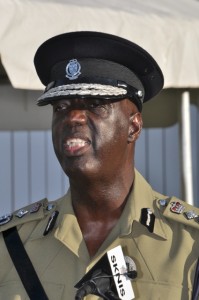Basseterre, St. Kitts(PAM Communications Unit) – Concerns in St. Kitts and Nevis are growing over what appears to be the erosion of the protection of the fundamental rights and freedoms of the people.

When the country attained independence in 1983 under the leadership of the founding father and first Prime Minister, Dr. Sir Kennedy Simmonds, of the People’s Action Movement, (PAM), one of the main articles that they ensured was placed in the new constitution, was contained in Chapter 2, the PROTECTION OF FUNDAMENTAL RIGHTS AND FREEDOMS.
The constitution states, in part, “Whereas every person in Saint Christopher and Nevis is entitled to the fundamental rights and freedoms, that is to say, the right, whatever his race, place of origin, birth, political opinions, colors, creed or sex, but subject to respect for the rights and freedoms of others and for the public interest, to each and all of the following, namely-
a) life, liberty, security of the person, equality before the law and the protection of the law;
b) freedom of conscience, of expression and of assembly and association;
Now it seems like the Labour Government of Dr. Denzil Douglas, through the use of the security forces, is determined to thwart the people’s constitutional entitlements and this must never be allowed to take place, said the leader of the People’s Action Movement, Hon. Shawn Richards, the two term parliamentarian for the town of Sandy Point.
The Constitution is the supreme law of Saint Christopher and Nevis and, subject to the provisions of the Constitution, if any other law is inconsistent, it is the Constitution that shall prevail and the other law shall, to the extent of the inconsistency, be void, Richards reminded.
PAM is also reminding all Kittitians and Nevisians that Section 12 of said constitution states, in part, “(1) Except with his own consent, a person shall not be hindered in the enjoyment of his freedom of expression, including freedom to hold opinions without interference, freedom to receive ideas and information without interference, freedom to communicate ideas and information without interference (whether the communication is to the public generally or to any person or class of persons) and freedom from interference with his correspondence.”
It also guarantees that “Nothing contained in or done under the authority of any law shall be held to be inconsistent with or in contravention of this section to the extent that the law in question makes provision.”
The people are also protected, said PAM, by section 13 of the constitution that speaks to the “Protection of freedom of assembly and association.”
13. – (1) Except with his own consent, a person shall not be hindered in the enjoyment of his freedom of assembly and association, that is to say, his right to assembly freely and associate with other persons and in particular to form or belong to trade unions or other associations for the protection of his interests or to form or belong to political parties or other political associations.”
(2) Nothing contained in or done under the authority of any law shall be held to be inconsistent with or in contravention of this section to the extent that the law in question makes provision.
The PAM leader’s comments come especially in light of the recent decision of the country’s Commissioner of Police, CG Walwyn, to prevent the opposition People’s Action Movement and other members of the opposition, from having a long planned march and rally on Wednesday 26th June, 2013.
On 29th May, PAM wrote to the police for permission to use a public address system to announce their March and Rally, which were scheduled for next Wednesday, starting at 4:30pm from Greenlands by the Tamarind Tree and ending at Bank Street. The laws of St. Kitts do not require the organizer to get police permission for a public meeting. However, if one plans to use a public address system, then permission must be sought for that.
Almost four weeks after the 29th May letter to the commissioner, he finally responded in a letter dated 17th June, but only received by PAM on Wednesday 19th June.
In his response, Commissioner Walwyn said to PAM, “I wish to refer to your request to hold a March and Rally on Wednesday 26th June, 2013, at 4:30pm, starting at Greenlands and ending at Bank Street. Please be advised that your request cannot be accommodated at this time.”
This decision is not acceptable to the People’s Action Movement and the party on Thursday 20th June, 2013, responded to the Commissioner, stating, “We note from your letter that your reason for refusal is due to your activities with the Music Festival. This reason is very perplexing since it appears that you have given priority to musical entertainment over the people’s constitutional right to march. You also state that you cannot accede to our request in the interest of safety and safety.”
The letter continued, “Please note that we did not ask for any security. The request was for the use of a public address system and hi-fi. You were also given enough notice to make any arrangement you wish to make in relation to the few officers that normally attend our peaceful marches. It was our intention to incorporate a prayer vigil as part of our peaceful march; therefore, there was no reason to apprehend any serious disorder.”
The PAM also stated in the letter that the constitutionally protected march must take precedent over any musical entertainment. The party told Commissioner Walwyn that they are surprised that he has not given the relevant consideration to their request and they wish to be informed on what section of the laws, is the police given the right to give preference to musical entertainment over constitutional rights. “We would therefore be grateful if you would review your decision in the interest of the people’s constitutional rights,” stated the PAM letter.
